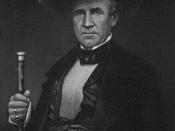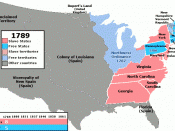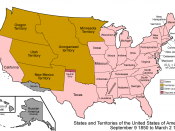The war against slavery in the United States brought about many conflicting moral arguments between peoples of different locations in the country. Northern opinion believed that slavery was in fact wrong, but unity between the North and South was a much deeper concern. The South stood strong in favor of slavery. Until slavery was abolished in 1865, the most important political actions in the United States were based on the topic of slavery.
In 1817, the Missouri territorial assembly applied for statehood and since slaves were already present in the territory, Congress would be required to take special action in order to admit Missouri as a free state. In February of 1819, an amendment was suggested, banning further admission of slaves into Missouri and other steps to removing slavery from the territory altogether. Southern senators protested that the amendment was proof that Northerners were conspiring to upset the balance of power between sections.
In February of 1820, after receiving application for statehood from Maine, a compromise was made. Missouri would be admitted as a slave state and Maine as a free state. A further amendment also stated that slavery would not be permitted in the rest of the Louisiana Purchase north of the southern border of Missouri. Despite the compromise, it was clear that any new territories that required Congress to decide the status of slavery would spark sectional hostility.
Early opposition to slavery believed that the institution was in fact evil, but felt it could only be removed gradually due to its deep economic and social roots. It wasn't until 1831, when William Lloyd Garrison launched a new and more radical slavery movement, that a call for immediate and unconditional emancipation of slavery was made. Efforts to condemn slavery continued and in 1833, the American Anti-Slavery Society was formed.


